- Home
- Jessie Haas
Shaper Page 3
Shaper Read online
Page 3
“Yeah? We’ll never know, Mom, will we?”
Mom closed her eyes. Chad watched her silently counting. When she finished, she turned back to the frying pan and scraped at the blackened onions with the spatula. “Believe it or not, Chad, I do know how you feel. He was a wonderful dog. But how long—”
She didn’t finish, just dumped the onions into the compost and took fresh ones from the bag. Chad sat on the couch. His hands trembled, and his heart felt stabbed. He made his face like a stone, though, and Mom didn’t say any more. A few months ago she’d have kept at him, maybe shaken him, but gradually she’d given that up. He sat there with tight fists, and in a while he heard Tiger’s hooves on the drive.
A few minutes later Julia burst through the door. “Chad, he wants to see you! David Burton! He says if you can come down tonight, he has something he’d like to discuss.”
CHAPTER
5
THE EVENING WAS cool and violet-tinted. Silver songs of hermit thrushes fluted across the hillside. As Chad walked down the road, ribbons of cooler air brushed his bare arms. His white T-shirt glowed in the dusk when he looked down to slap at mosquitoes.
The tiger cat—had she called it Malkin?—waited on the step. It met his eyes knowingly and rose to its feet. Chad knocked on the door. Inside, footsteps. His heart sped a little.
“Oh, hello!” David sounded surprised. Julia got it wrong, Chad thought. He doesn’t want to see me. But David was saying, “Come in, come in.”
Chad stepped into the hallway. It was bare, not even a rug. Light glowed out of an upstairs room.
“You’ll have something cold, won’t you?” David asked. “You should enjoy the results of all your sweating with that refrigerator!”
“That was Jeep.”
“Jeep? He’s your grandfather, right? Well, I don’t deny I was glad to see him, but he only came along at the end.” David led Chad toward the kitchen. No Louise there either; she must be upstairs where the light was.
A table and three chairs were the only furniture. The table was pushed up against the front window. It had a red cloth on it, a lamp with a glowing white glass shade, a green pottery bowl. The middle of the room was empty, and the kitchen seemed enormous.
David got three jelly glasses and a saucer from the cupboard. Malkin circled his legs, making remarks.
“Malkin’s having milk. What would you like?”
“Um—” He could hear footsteps coming down the stairs. “Uh, milk is fine.” She was coming. She was almost—
“Oh!” Louise said. “Hi!”
She wore a pale T-shirt and green leggings, and she was barefoot. Beautiful feet, long and arched …
“You’ve met, haven’t you?” David asked.
“Yes.” Louise smiled at Chad. Her hair was combed up into soft peaks, like meringue or like the hair on a Greek statue, a crown of standing-up curls. Among them a pair of small horns would barely be noticed. Chad took a long swallow of milk and tried not to feel helpless.
Louise went to the refrigerator. “Do we have any—oh, here it is!” She brought out a plastic-wrapped plate of something gray-colored and loaf-shaped that smelled like liver-wurst. Malkin wove around Louise’s legs, giving excited cries, then levitated straight onto the table beside the plate.
David and Louise exchanged a look. David raised his eyebrows. Malkin purred loudly in the silence, and Chad thought one of them would take him off the table. But they didn’t move. Chad was aware of old house around him, of the dusk, of the fact that they were strangers.
“Oh, I know!” Louise said suddenly. “Chad’s sitting in his chair!”
Chad half rose, feeling guilty, and David made a no-no motion with his hand. “You’re right,” he said. “That has always been his chair.”
“But—” Chad’s voice croaked. He cleared his throat. “Couldn’t he sit in that chair?” The third chair was vacant, except for Louise’s knee crooked over the back of it, her leg cased in green, like a long, strong stalk, her foot planted on the seat. Her toenails weren’t painted. They were pink and glossy, and Chad wanted to stroke them as if they were little animals.
“We could teach him to choose any empty chair,” David said, removing the plastic wrap from the plate. “Maybe we should. I hadn’t realized that he considered that chair, and no other, to belong to him.”
“If we’re going to have a social life, Daddy, we’ll need a fourth chair!”
David smiled a little sadly and cut a tiny diamond-shaped corner from the loaf. “Sit,” he said, in a quiet voice.
To Chad’s astonishment Malkin sat, purring so hard he squeaked.
“He sat!”
David gave Malkin the whatever it was. “Oh yes.”
But he’s a cat! Chad thought. He decided not to say it. It seemed rude.
David cut a larger slice of the substance, spread it on a cracker, and handed it to Chad. “We don’t live like this usually,” he said. “We had a little celebration.”
“Pâté,” Louise said, smiling at Chad. “Lots better than it looks!”
Chad took a cautious bite. For a moment the liver scent rose through his nostrils. Then a deep, spicy flavor, meaty and creamy and rich and light, made him forget that. “Wow!”
“It’s expensive,” Louise said, “but now you know. We buy it when something nice happens.” She perched a substantial wedge of pâté on her own cracker and took a bite.
What happened that was nice? Chad wondered. And how soon would it be polite to have more?
“You went away the other day before I could thank you,” David said. “You probably saved my life! Louise would have arrived to find me pinned under the stove—”
“And Mum would have done a victory dance!”
“Undoubtedly.” David reached for another cracker. Chad watched him handle knife and cracker. Then he put the knife down, and Chad reached for it.
“So I still owe you,” David said.
“Big time!” said Louise.
“But meanwhile, and the reason we’re celebrating—” He looked across at Louise, and their eyes shone in the same way. For a second they did look alike. Louise’s face glowed with warm color, and David’s was pale; Louise’s eyes were dark, David’s blue. But their heads were the same shape, and they shared a kind of elegance.
“They bought Daddy’s book!” Louise said.
David said, “And now all Daddy has to do is write it!”
Could you sell a book before it was written? Chad hadn’t known that.
“It’s called Behave!,” David said, “and it’s about the new science of training.”
“Or the art,” said Louise.
“The art of the science—Anyway, I’ll need a research assistant, Mr. Holloway, and I wondered if you might consider the job.”
A research assistant? The science, the art. The phrases jumbled in Chad’s mind, and he felt a warning in the pit of his stomach, in the hollows of his elbows, and at the backs of his knees.
“What I need is someone to teach games to,” David said. “Somebody to—”
“Manipulate!” Louise’s voice sounded sharp-cornered and malicious, the way it had this afternoon when she was imitating her mother.
“A few hours a week,” David said, ignoring her.
“But why not—” He couldn’t say her name in front of her. He just looked.
“Louise knows too much,” David said. “I need someone for whom it will be new, someone I can teach from scratch. Besides, Louise leaves at the end of August.”
Louise leaves? That must be what Helen meant about the custody arrangement: that Louise would leave, that she wasn’t staying. Chad remembered with what indifference he’d learned this. She wasn’t Louise then, just “the daughter.” He hadn’t even seen her.
He noticed the hum of the refrigerator and the silence that surrounded it. David smiled across the table at Louise, a smile like Mom’s earlier this evening, strained and false. Louise frowned back. Her eyebrows made velvet swirls, like cray
on strokes.
“So I thought of you, Chad,” David said after a moment. “You’d be paid, of course. Are you interested? I’d like to start soon.”
That was what decided Chad. Louise was leaving. A moment ago the end of August had been an empty eon away. Now it bore down like a runaway eighteen-wheeler.
“All right,” he said. “Yes, I’m interested.”
“Great! The next step is to talk to your parents,” David said. “Meanwhile, cut yourself a slab of pâté and a little piece for Malkin. Let’s all celebrate!”
CHAPTER
6
CHAD REACHED HIS room that night without a word to his parents; they were struggling to get Sky to bed.
When David called the next morning, Mom was surprised—and franker than Chad thought absolutely necessary. “I’d like to meet you first! We don’t know a thing about you!” The words drove nails into Chad’s stomach. David and his family, like bleach and ammonia, should never mix.
So, of course, Mom invited David and Louise to the farm for a picnic after haying. “That way we all can check him out,” she said when Gib objected. “Besides, it’s only neighborly.”
“You think it’s neighborly to unleash your sister on a divorced dog trainer?”
“I don’t know why you always have to make comments about V!” Julia said.
Chad thought: this is going to be awful!
But that afternoon, riding the hay wagon, he felt fizzy. Louise lived on this hill. There, just below the tallest pine. Yesterday he hadn’t known that.
It made even Julia tolerable. Uh-oh! he thought whenever he looked at her. Maybe Louise had walked down the hill with Julia, but first she’d said “uh-oh!”
Sky rode the tractor, between Jeep’s arms and legs the way Chad used to ride. When Jeep stopped and got down to help pitch bales, Sky sat gripping the wheel, making loud brake noises.
Chad worked fast to keep up with the three of them, not building a wall of silence today, not doing anything but lift, heave, shove. His spirits sang, and his stomach churned. Louise lived on this hill. She was coming.
Gib talked: lightbulbs, business, fire department. The questions were long, Jeep’s answers short, and Gib must be wondering what he always wondered: Would Jeep ever like him?
You don’t want him to, Chad told his father silently. He reached for a bale Gib was struggling to put on the wagon. Gib seemed smaller than last year. Chad had grown, but Gib had shrunk, too, in his year of indoor, sit-down work.
Jeep didn’t need help. Jeep was made of iron.
The wagon was about half full, the remaining bales scattered like dark animals grazing the stubble, when the long-legged silhouettes Chad had been watching for appeared at the top of the field. “Hello,” David called. “Give you a hand?”
They weren’t dressed for haying. Both wore shorts and sleeveless shirts and sandals. The sun gleamed on the downy hair of Louise’s legs.
Jeep said, “More the merrier!”
In a moment Louise scrambled onto the wagon. She stood graceful as a heron, gazing down the field.
“What’s that?”
Chad looked where she was pointing. A patch of orange-red stood out against the stone wall. “Fox!”
Everyone looked. The fox considered them for a moment and vanished. Jeep nodded after her, as he’d nod to a neighbor on the road. “Tractor stirs up bugs and mice, and then she comes.”
“Snakes, too,” Julia said. “You find them dead in the bales. Never grab without looking!”
“Yuck!” Louise shivered, and her sandals slipped. She clutched at Chad for a second and sat down abruptly. “It’s high up here!”
Jeep looked to be sure they were sitting, then set the tractor gently in motion. The wagon swayed deeply. Louise’s knuckles whitened on the edge of a bale.
“It’s all right,” Chad said. “It won’t tip.” She didn’t answer, just reached for his wrist and gripped it tightly. Chad felt a sun blossom in his chest.
The wagon stopped on flatter ground. Louise let go, they both stood up, and the bales started coming. Louise reached for one and yanked. Her body arched upward, and the bale stayed where it was.
“Wow!” She opened her eyes wide at Chad. “No wonder you can sling refrigerators around! I can’t budge this.”
“Just roll ’em to me,” Chad said.
“Oh! Just roll them!”
But she could do that, and now every time Chad turned there was the dark meringue of Louise’s hair, her body bent over a bale, her beautiful curved wrists …
And there was everyone else, watching. Chad felt completely tongue-tied. Thank goodness there was work to do, and when Jeep pushed up the last bale, Gib, Julia, and David climbed on to ride. David and Louise sat side by side, arms wrapped around their knees, looking across the land. A long pink welt marked Louise’s calf. Chad could hardly keep his eyes off it.
“It’s like being in a painting!” she said.
Chad started. It was exactly like a painting, the one he’d tried last year. Wagontop, he’d titled it, and it was a mess. The dogs were the best things in it: black-and-white Ginger, auburn Shep.
Queenie, now; he’d use yellow ochre, raw umber, a touch of burnt sienna.…
He felt sick for a second, couldn’t think why, and looked down the field at the clump of sumac, the sumac where he’d sat and painted and heard the shot and thought nothing of it.
When all the bales were stacked in the barn, they wandered outside in a group. Jeep swung Sky up onto his shoulders. “Look at the stock?” he asked David.
“Yes, I wondered who was going to eat that hay.”
The barnyard was behind the barn. Shade darkened the lane leading to the pasture. The animals loafed toward the gate for their evening’s graze. The red cow made a knobby silhouette. Her calf clung close to her hindquarters, but the steer turned to look at the visitors with dim curiosity. The old workhorse came straight to the gate and thrust his graying muzzle at Louise’s face. She exchanged breaths with him and gendy scratched his long nose.
“That’s Billy,” Jeep said. “Twenty-six years old. Lost his mate two years ago, and he’s enjoyin’ retirement.”
“Is he past work?” David asked.
“He could work if I wanted to bother, but I don’t have much for one horse to do, and since I don’t work him, he isn’t fit. It’s work keeps us going,” Jeep said.
They visited the pig, and then headed toward the house. V’s delphinium blue Beetle was parked near the shed. Louise said, “I love these! Daddy, if your book hits the best-seller list—”
“Or I find a winning lottery ticket!”
“Whatever. This is what I want, except ask me which color, because I can’t decide—oh!”
“Oh, what?” David said, and looked where she was looking, at the gold business logo on the door of the Beetle. Chad knew to the comma what it said: “Vivian Starchild, Animal Communicator. Lost Pets Found, Training Problems Solved, Psychically.”
CHAPTER
7
WHY? WHY WHY why why why?
Why did she have to say, “Training Problems Solved”? Why did she have to park the Beetle logo side out?
Why did she even have to be here? V didn’t live on the hill. She lived twenty miles away, and she didn’t own any hay eating animals, and there was always a spat when she and Mom got together, especially here at their childhood home … so why?
And why did Helen have to love those stupid tobacco flowers, which opened to beautiful white stars at night and in the daytime hung on the stalk like used tissues? One or two could be ignored, but Helen had to have dozens right next to the picnic table, looking as if they belonged in a wastebasket.
Didn’t Mom own anything but tie-dye? She must have worn something before they started Rainbow People. Couldn’t she dig it out? Did she have to laugh so loudly and have such a stubborn round chin and look so much like Julia? V, whatever else she might be, was beautiful, and she acted it.
Introductions. Too l
ate Chad realized he should have made them. But everyone seemed up to the task of saying his or her own name. When David and V shook hands, Chad felt his face turn red. Even from behind, even from a distance, he could see David stiffen with reservations. Don’t even think about her! he thought at David. I’m not psychic!
He caught himself sending this thought-shout and had to smile. He could still, just barely, smile. Sit tight, Chad. Don’t do anything, don’t say anything. David already wants to hire you, so just sit tight.
It was all he could do, though, not to rush over and intervene when V started talking with Louise. V regarded certain professionals with dislike: scientists, veterinarians, and most conventional animal trainers. They were arrogant and condescending to people like her. She must know what David did. Helen would have told her. Talk about the weather, V! Talk about the weather!
David wanted to know things. This was called Houghton Hill; had the farm always been in the family?
Jeep shook his head. “I bought this place in 1953.”
“Did you grow up around here?”
“Jeep was an orphan,” Helen said. “He grew up all over the place.”
“All in Vermont, though,” Mom said, as if anxious to correct a wrong impression.
Don’t! Chad thought. He sat even stiller. Not those stories: Jeep the orphan; the families who took him in for the work an eight-year-old could do. Depression-era Vermont. Poor farmers. “Being poor doesn’t have to make you mean,” Helen would say, and start telling about her family, the saintly Minards. Hang tight, Chad.
“Whereas I grew up in Burlington,” David said, “of which they say, ‘It’s so close to Vermont!’ And my daughter is a Flatlander.”
Now they talked about David and where he’d lived, and Chad could relax a little. There were potato chips on the table, lemonade, deviled eggs. One thing that would definitely impress David was Helen’s deviled eggs—Oh no! V was telling Louise the rabbit story.

 Chase
Chase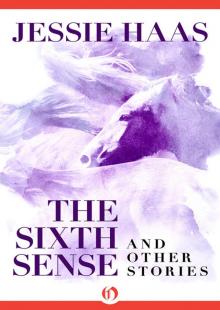 The Sixth Sense
The Sixth Sense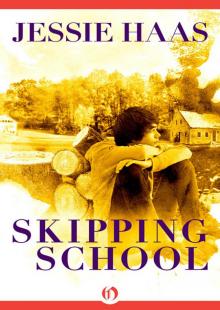 Skipping School
Skipping School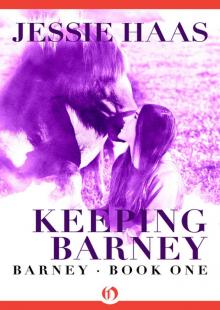 Keeping Barney
Keeping Barney Unbroken
Unbroken Westminster West
Westminster West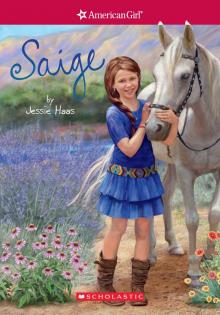 Saige
Saige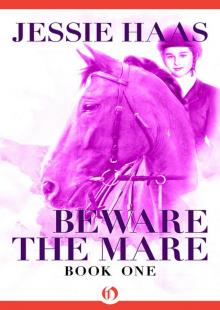 Beware the Mare
Beware the Mare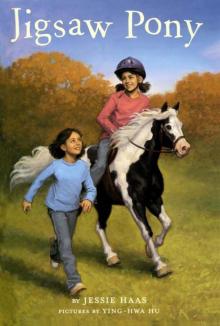 Jigsaw Pony
Jigsaw Pony Rescue
Rescue Saige Paints the Sky
Saige Paints the Sky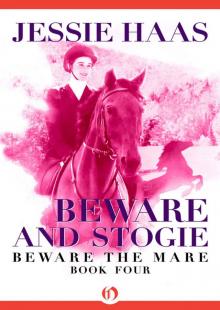 Beware and Stogie
Beware and Stogie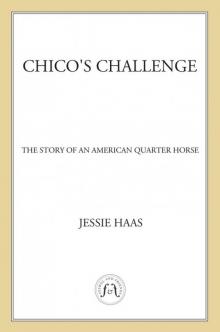 Chico's Challenge
Chico's Challenge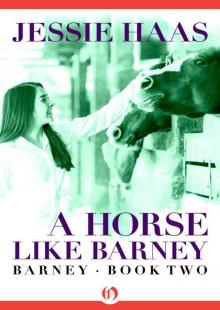 A Horse like Barney
A Horse like Barney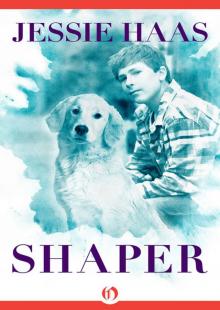 Shaper
Shaper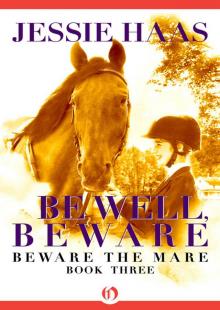 Be Well, Beware
Be Well, Beware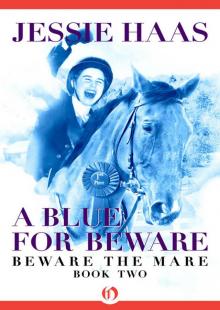 A Blue for Beware
A Blue for Beware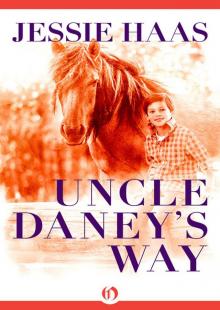 Uncle Daney's Way
Uncle Daney's Way